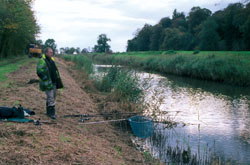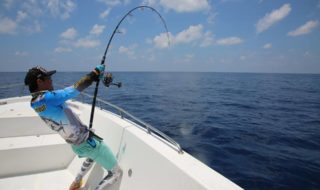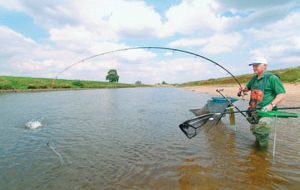| There is excellent pike and silver fish sport to be enjoyed. |
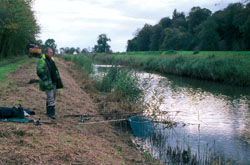 |
THE western arm of the Royal Military Canal at Winchelsea could possibly be described as the poor relation of the section of canal that runs from Iden Lock to Hythe.
Although it is not nearly so well known, and is only connected indirectly through the river system to the stretch running around the perimeter of the Romney Marsh, this shorter stretch of the canal does contain some very good fish and is a very popular water.
When the canal was dug during the Napoleonic wars, to keep out the French, it stopped at Iden Lock where it entered the River Rother; in effect, the river became the canal at that point. The River Brede, entering the Rother at Rye, also became part of the canal where it runs westwards towards Pett Level. At Winchelsea Beach the western canal enters the Brede and runs behind Pett Pools to the base of Fairlight Cliffs, while the River Brede changes direction and runs northwest inland.
Back to its best
The ‘Seaside Bank’ is controlled by the Clive Vale Angling Club and has proved to be a valuable asset to them, while the other bank is an SSI site owned by the National Trust who do not allow angling on it.
Over the years the venue has received stocks of roach, rudd and pike, many coming as a result of unwanted stocks of coarse fish being removed from the local trout reservoirs.
And, back when the water companies controlled the fishing here, a small dyke that runs alongside the canal was electro-fished and all the tench, including fish to 6lb, were transferred to it.
Soon after that a fish kill affected over half the length, resulting in many of the venue’s fine specimens being lost. At the time, the problem was thought to be a lack of oxygen brought about by stormy conditions.
Naturally enough, anglers stopped fishing the water but the problem wasn’t as bad as first thought and what appeared to be a total wipeout turned out to be nothing of the sort.
Fish from above the affected area soon re-inhabited the stretch and, after further stockings by the club, it was soon back to its best.
Rake the swim
The canal does, however, suffer from heavy weed growth in the summer and anglers fishing it at this time of year usually need to rake a swim in advance.
Some will rake a swim in the evening, groundbait it and return in the morning to fish for tench and rudd. Carp to low-double figures have been taken in this way too, and have also been caught from the surface on dog biscuits and floating crust.
However, it is in the autumn when this stretch really comes into it’s own. With the weed dying back and the bankside vegetation cut by the Environment Agency it fishes well from then until the end of the season.
Like many of the drains of the Romney Marsh, the canal is a brilliant pike water and boasts plenty fish in the 4lb to 8lb class, and more than a few doubles. Before the fish kill it produced fish to over 20lb, and may well still hold fish of that weight, although the biggest authenticated pike in 2004 weighed 17lb.
Deadbaits cast close to the thick beds of marginal reeds work well, with dead roach an especially good bait. Sea-fish baits also work well, though, with mackerel often picking up the better fish. Spinners and plugs pay off at times, but they are better towards the end of the season when the weed clears completely. Surface and sub-surface plugs can also score because the water is fairly shallow, with four feet at best, and sometimes less than three feet when the authorities run water off during wet weather,.
Nomadic carp
For the pole angler it’s an ideal water if you want to fill your net with silver fish. There are hordes of small roach and rudd, with a few skimmers, that will happily take maggots, casters or worms.
Bigger specimens are present, however, and both the roach and rudd run to over the pound mark, and in places there are a few bigger bream knocking 5lb.
There’s also a chance of bagging a big tench, even in winter; they run to at least 5lb, but it generally pays to fish fine, with small hooks and baits.
The venue’s nomadic carp roam along the canal, often keeping to the more overgrown stretches where carefully placed baits in the right swim have been known to throw up a few surprises. Some of the water’s biggest carp have been caught on worms, corn or breadflake, but boilies also work when fished over a bed of pellets.
Perch are also present in the canal, with the occasional fish pushing 2lb being taken by anglers fishing maggots or worms. Fish baits are usually a waste time for perch because of the number of pike.
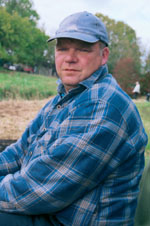 |
“The fishing has recovered well
after the fish kill, and the pike
are getting bigger.”
Local angler Danny White
Venue Fact File
Royal Military Canal, Winchelsea Beach, East Sussex
Contact: Kevin Thornley on 01424 719703 or Brian Christopher on 01424 438987
Day tickets: None
Annual membership: Clive Vale Angling Club membership costs £35 for seniors and runs from April 1st. Juniors, OAPs, ladies and disabled anglers pay a reduced fee of £17
Restrictions: No livebaiting. Use groundbait in moderation. No litter and no fires
Facilities: Car parking is in lay-by opposite
Nearby tackle shop: Hastings Angling Centre 01424 432178
Nearby pub: Bridge Inn, The Strand, Winchelsea, tel. 01797 224302
How to get there: Take the A259 from Hastings and travel towards Rye. Then, 400 yards after the hairpin bend at Winchelsea, turn right by the garage and head towards Winchelsea Beach. After 20 yards the canal runs under the road into the River Brede. Fishing is on the far bank on the right hand side of the road


